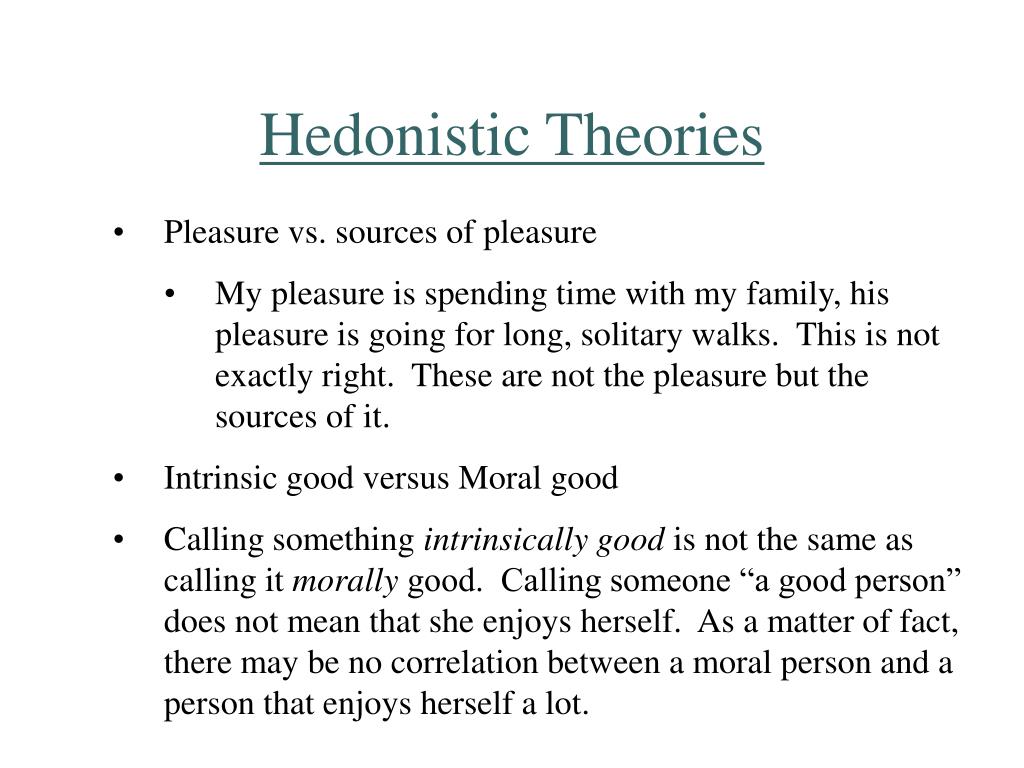

The Paradox of Hedonism (also called the Pleasure Paradox), points out that pleasure and happiness are strange phenomena that do not obey normal principles, in that they cannot be acquired directly, only indirectly and we often fail to attain pleasures if we deliberately seek them. A similar but more altruistic approach results in Utilitarianism, the position that the moral worth of any action is determined by its contribution to overall utility in maximizing happiness or pleasure as summed among all people. Epicureanism is a more moderate approach (which still seeks to maximize happiness, but which defines happiness more as a state of tranquillity than pleasure). Hedonism usually pre-supposes an individualist stance, and is associated with Egoism (the claim that individuals should always seek their own good in all things). It is the normative claim that we should always act so as to produce our own pleasure. Ethical Hedonism, on the other hand, is the view that our fundamental moral obligation is to maximize pleasure or happiness. Psychological Hedonism is the view that humans are psychologically constructed in such a way that we exclusively desire pleasure. They believe that pleasure is the only good in life, and pain is the only evil, and our life's goal should be to maximize pleasure and minimize pain. Hedonists, therefore, strive to maximize their total pleasure (the net of any pleasure less any pain or suffering). Register for the Daily Good Word E-Mail! - You can get our daily Good Word sent directly to you via e-mail in either HTML or Text format.Hedonism is the philosophy that pleasure is the most important pursuit of mankind, and the only thing that is good for an individual.

(It is a real pleasure, indeed, to again thank Mark Bailey for contributing such a sweet word for today's Good One.) It also went into the making of suavis "pleasant", which went on to become French suave. The S remained in Latin, however, where the root appears in the verb suadere "to urge", still visible in the English borrowings persuade and dissuade. Word History: Today's Good Word is not based on the teachings of Hedon, but on the Greek word hedone "pleasure", a word related to English sweet and German süß! It all began with the Proto-Indo-European root swad- "sweet, pleasure" with an initial S that became H in ancient Greek as S often did back then.

Those of us who find suffering difficult to escape generally consider today's Good Word pejorative: "Jessie Noff devoted his life to fighting the godless hedonism in North America." In Play: A hedonist focuses his or her life on physical pleasures: "Jack Uzzi is a hedonist who ran though his inheritance in a year-long extravagance of gluttony, drinking, and other sensual indulgences." His indulgences would have broken the hedonometer-if only we had one. A distant cousin of today's word is hedonic "pleasant, pleasurable", which has no philosophical implications. The adjective here is hedonistic, but don't forget to insert the empty suffix -al when using it adverbially: hedonistically. However, many think that pain and suffering have an equally important place in life (the Russian novelist F.

Notes: The stuff that drives a hedonist is hedonism. An adherent of the philosophy that anything pleasurable is good and anything painful, bad. Someone whose life is devoted to pleasure and the avoidance of pain.


 0 kommentar(er)
0 kommentar(er)
